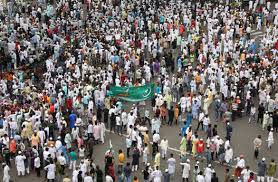Tension continues to simmer in parts of India following the booking of over 1,300 Muslims who participated in peaceful rallies expressing love for the Prophet Muhammad (Peace Be Upon Him).
According to a detailed report released by the Association for Protection of Civil Rights (APCR), at least 1,324 individuals have been named in 21 First Information Reports (FIRs) filed across various states, with 38 confirmed arrests made so far. The report sheds light on what many observers are describing as a targeted legal clampdown on religious expression.
The bulk of the cases stem from Uttar Pradesh, where 16 out of the 21 FIRs were lodged, involving over 1,000 accused individuals. The situation escalated after an incident in Kanpur, where police reportedly intervened during a Barawafat procession due to the presence of banners bearing the slogan “I Love Muhammad.” This triggered a broader crackdown that spread to other districts and states.
In Unnao district alone, authorities filed eight cases implicating 85 individuals, with five arrested. Kaushambi district recorded 24 people booked and three arrests, while Baghpat had 150 accused and two taken into custody. Outside Uttar Pradesh, similar enforcement actions were reported: in Uttarakhand, 401 people were booked and seven arrested; Gujarat saw 88 accused and 17 arrests; while isolated cases were documented in Baroda and Byculla (Maharashtra), each involving one person.
While police officials maintain that these legal actions are grounded in public order concerns, the APCR and several community leaders argue that the response has been excessive and appears to disproportionately target Muslim participants. The peaceful nature of the rallies — where demonstrators simply displayed slogans and marched in groups expressing reverence for the Prophet — has sparked widespread criticism among civil society groups and human rights observers.
The APCR’s report, based on a combination of official records and field-level investigations, points to a pattern of selective enforcement. Though the specific legal provisions invoked remain unclear in the public summary, the FIRs reportedly draw upon various sections of the Indian Penal Code. It is also noted that some of the cases involve multiple accused persons per FIR, leading to a significantly high total number of individuals implicated.
The fallout from the legal actions has extended beyond the courtroom. Many of those booked are said to be ordinary citizens, whose livelihoods and reputations now hang in the balance as they await the slow wheels of justice. There is concern that prolonged legal proceedings could result in long-term socioeconomic disruption for families affected, especially in the absence of bail or clear legal guidance.
This is not the first time religious gatherings or expressions within India’s Muslim community have faced scrutiny.
The APCR highlighted that similar incidents in recent years have often led to prolonged legal entanglements without substantial convictions, raising questions about the broader implications for freedom of expression and the secular spirit enshrined in India’s Constitution.
Community leaders and civil rights organisations are now calling for an immediate review of the cases, and the APCR has signalled plans to submit its findings to national and international human rights bodies, in addition to seeking judicial intervention where necessary.
As the ‘I Love Muhammad’ slogan continues to resonate among Muslims as a peaceful declaration of faith and devotion, the legal backlash has reignited critical conversations around religious freedom, civil liberties, and the role of law enforcement in a pluralistic society.
